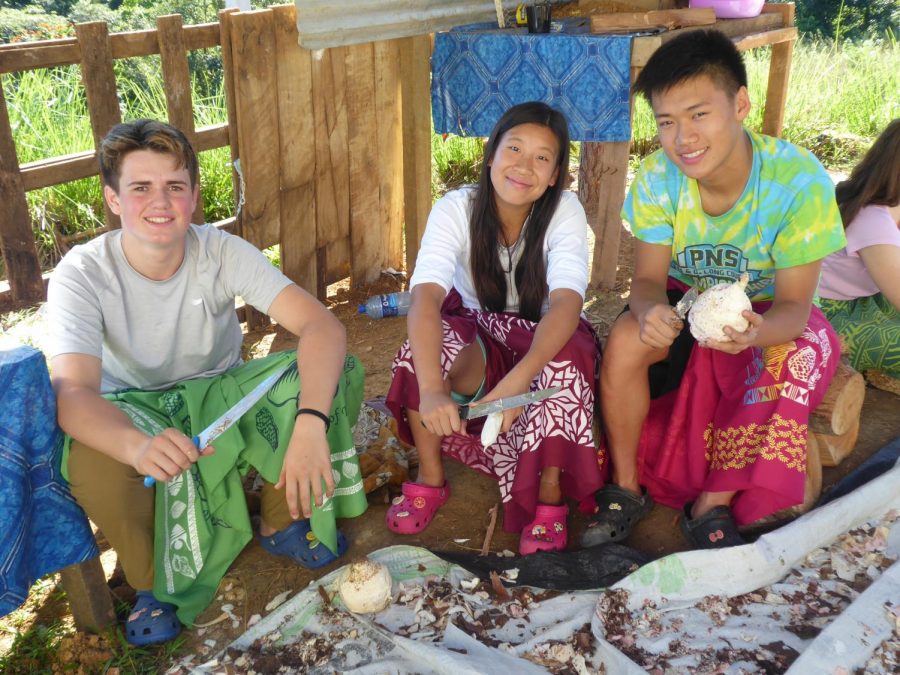Risk, Responsibility, and the Future of GSL
More than nearly missing his flight to Fiji or riding through the mountains in the back of a pickup truck, more than the afternoons spent playing rugby with his host siblings or the stomach bug he contracted from a suspect bottle of orange juice, what Jack F. ’22 remembers most about his 2019 Lakeside Global Service trip were his late-night conversations with his host uncle. They talked about everything from his host uncle’s time as a professional rugby player, to Fijian marriages, to the legacy of British colonialism, giving Jack an expanded cultural perspective uncommon in high school freshmen.
Unlike many American travelers in Fiji, Jack and the 11 other Lakesiders on his trip did not spend their time lounging at a resort; instead, they lived with a Fijian family in Tukuraki, a remote village, where they assisted the community with tasks such as teaching children animal names in English, paving concrete walkways, and planting shrubs.
“I looked at the way I live in Seattle and how much stuff I had and how much food I wasted,” Jack says. His service work made Jack realize that GSL wasn’t about him — it never was. It was about working hard, listening, gaining a sense of duty and perspective. When he came home from Fiji, he had 25 service hours; now, he has 200.
Jack is one of only 30 or so current Upper School students who have experienced one of the four-week-long journeys to a developing country — a stark comparison to pre-pandemic numbers, when around 60% of students had traveled on a Lakeside GSL trip by the time they graduated. The program, a unique selling point at admissions events and a source of excitement for many Lakesiders (90 of 103 surveyed students say they would have been interested in joining a GSL trip without the threat of COVID-19), was one of many opportunities lost to the pandemic. Except for the Advanced Ecology class’ four-day trip to the San Juan Islands last spring, the Global Service Learning program has been inactive for two years, and its return presents a host of logistical and ethical questions. Managing GSL’s rebound is Lisa Devine, the associate director of global programs.
Ms. Devine, who has lived in locations spanning from China to Mexico to Egypt, is hopeful that international GSL trips with homestays will return as soon as the summer of 2023. But while this means that current juniors are unlikely to experience a full international trip, Ms. Devine proposes domestic GSL trips, potentially centered around Washington’s indigenous or migrant worker population, as an option next summer while international travel remains risky.
The spread of COVID-19 presents an obvious risk to the safety of international travel, but other types of sickness are just as concerning. “Students on GSL trips get fever, diarrhea, vomit, stuffy nose, sore throat, all the time for any number of reasons,” Ms. Devine says (as Jack can attest to). The difficulty in distinguishing between COVID-19 and other illnesses — especially when in remote locations, where many trips have taken place in the past — play a large role in Ms. Devine’s risk analysis. In addition to the dangers to students’ safety, Ms. Devine is cognizant that GSL and homestays have the possibility of spreading COVID-19 to local communities, the very people the program tries to support.
As Ms. Devine attempts to weigh the risks and rewards, she recognizes the disappointment felt by many students. “I don’t want students like you to go through your whole upper school experience not being able to have GSL,” she says. “There’s only so much of that that we can control ourselves.” As GSL has taught students like Jack, sometimes it is necessary to look beyond Lakeside, the United States, and the self to get a broader sense of what really matters.
Don't let the name fool you; Stellan Will do the Max, which is also his name (and is preceded by that of his brother). He's a Mountain Man, he's a Lakeside...

